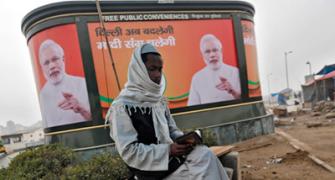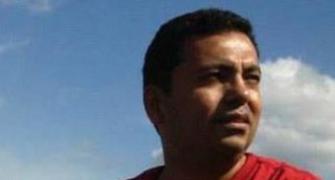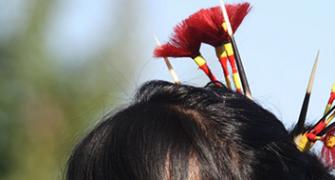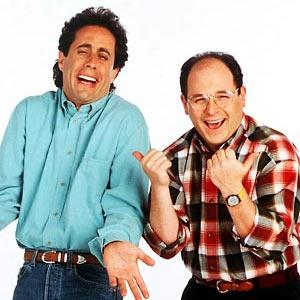'This is a fight between pro-democratic forces and Islamic conservatives, who view India as a "necessary evil",' a New York-based expert on the Maldives tells George Joseph for Rediff.com
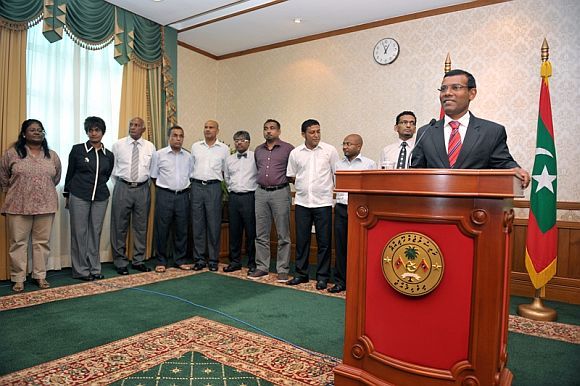 The sentencing of Mohamed Nasheed, the first democratically elected president of the Maldives, to 13 years in prison on terrorism charges, is alarming, says an expert on the smallest country in Asia, both in area and population.
The sentencing of Mohamed Nasheed, the first democratically elected president of the Maldives, to 13 years in prison on terrorism charges, is alarming, says an expert on the smallest country in Asia, both in area and population.
"Nasheed is a true liberal and believer in democracy. He is a friend of India too. By getting rid of him from public life, the religious conservatives are trying to fully control the nation. It is worrisome for all," the New York-based expert, who spoke to Rediff.com on condition that he would not be identified for this report, noted.
"This is a fight between pro-democratic forces and Islamic conservatives, who view India as a 'necessary evil', even though India's help is vital for its survival."
Nasheed, a respected human rights and environment campaigner, was elected president in 2008 in the first free election after the end of Maumoon Abdul Gayoom's 30-year autocratic rule.
Four years later and one year before his term ended, he was ousted in a police coup and he took shelter in the Indian embassy.
In the general election that followed, in 2013, Nasheed's party contested without an alliance, an unwise decision it turned out.
His party won the largest number of seats, but failed to win a majority. If he had contested the election in alliance with a smaller party, he would have received the required majority, the expert said.
Nasheed was arrested and charged for his role in ordering the arrest of the chief judge, just before leaving the presidency. Ordering the judge's arrest was not a wise move, though the judge was alleged to have a dubious record.
In 2013, Abdulla Yameen, a half brother of Gayoom, became president. Gayoom took over as the islands's foreign minister.
Conservatives on the islands consider Nasheed's liberal views as against Islamic tenets.
Once a person is sentenced to a prison term in the Maldives, he cannot contest an election again.
India, America, the West and international organisations have protested Nasheed's arrest, calling for a free and fair judicial process.
Had Nasheed not taken refuge in the Indian embassy in 2012, he would have been arrested then.
Nasheed's sentencing has provoked protests on the islands, though no violence has been reported yet. The Maldivian people, who have now tasted liberal democracy, may not tolerate a return to religious conservativism, the New York-based expert felt.
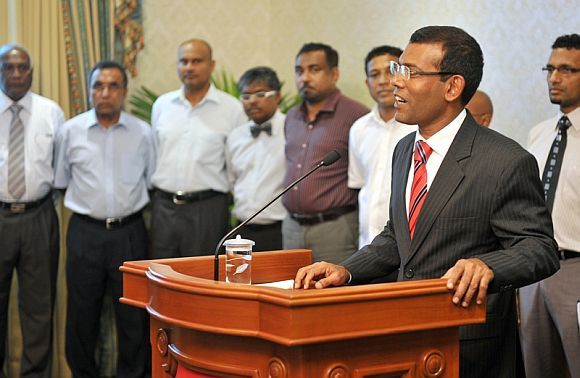
"The present crisis is a huge one and might lead to instability and uncertainty. People are on the edge," he told Rediff.com
He cited reports that dozens of Maldivian youth have joined ISIS. "It is a large number for a small country with a tiny population," he added.
India, he felt, cannot do much about the Maldives's internal problems, though it had acted against external threats to the islands during Rajiv Gandhi's prime ministership.
India is responsible for the security of the Maldives, which is only 45 minutes away from Thiruvananthapuram and 90 minutes away from Bengaluru by air.
Most of the intellectual work on the islands is done by Indians, who work as accountants, managers etc.
Yet the islands's conservatives look at India with suspicion and favour China, the expert added.
China is trying to get a foothold on the Maldives, but has not been successful yet. Half of the tourists who visit the Maldives are from China.
Nasheed had advocated stronger relations with India and limiting China's influence.
Strategically, the Maldives is very important for India as it is an oceanic gateway to India. Considering that terrorists use the seas, it is important to have a presence in the islands and know what is happening there, the expert noted.
Nasheed, reports say, smiled when the verdict was read out. In a statement released by his office, he called on the people to 'confront the dictatorial power of this regime' and to 'take all of your lives in your hands and to go out on to the streets.'
'Do not consider either the security of your personal lives or the transitory happiness of your wives, husbands, children, parents and relatives; for the security of all of your children and their children is in jeopardy,' the former president said.
In February the police dragged Nasheed into court despite his protests that he would go willingly on his own.
'We are deeply concerned over the developments in the Maldives,' the spokesman for India's ministry of external affairs said.
In an interview with The Guardian newspaper before his arrest, last month, Nasheed called for the international community to consider sanctions against the island nation as a last resort and called on tourists to learn more about the Maldives before they decide to visit.
'We are particularly troubled by reports that the trial was conducted in a manner contrary to Maldivian law and the Maldives' international obligations to provide the minimum fair trial guarantees and other protections under the International Covenant on Civil and Political Rights,' a statement issued by the US embassy to Maldives and Sri Lanka said.
According to the US statement, this includes the denial of legal representation to Nasheed during the first hearing and concerns regarding the lack of impartiality and independence of the judges.
'We urge the government to ensure former president Nasheed's safety and well being in custody, and we hope all Maldivians will express their views peacefully,' the US government statement added.
Images: Then Maldives President Mohamed Nasheed announcing his resignation, February 2012.
REDIFF RECOMMENDS

